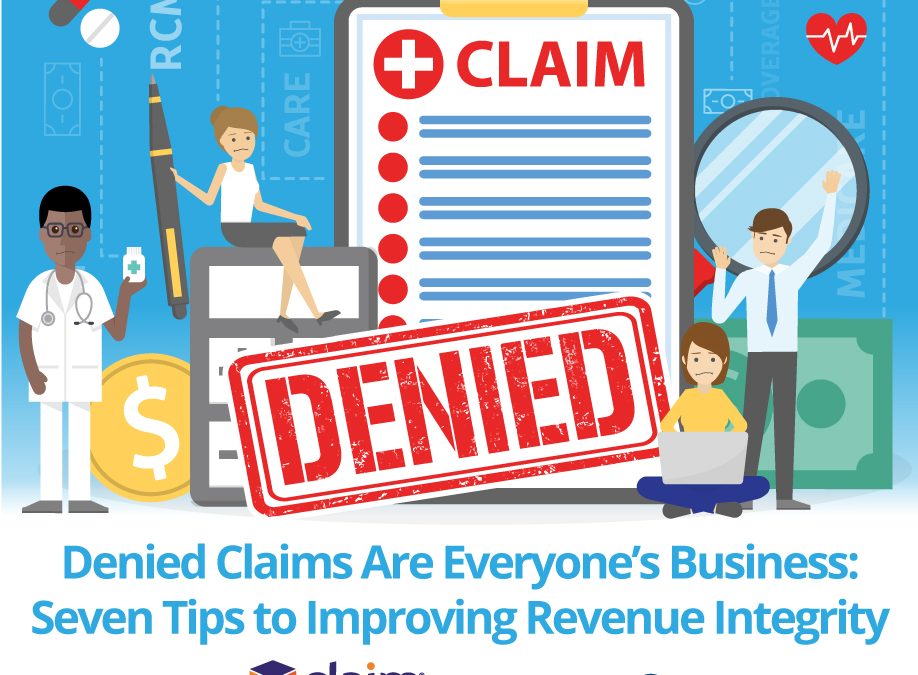
Seven Tips to Improve Revenue Integrity
Contributed by Timothy Mills, Alpha II, LLC
Claim denials are the bane of every RCM company. Chasing money is costly and navigating regulations, coding edits, and health plan particularities can frustrate even seasoned billing professionals.
The American Association of Family Physicians puts the average claim denial rate at around 20 percent and reworking a single claim can cost hospitals and offices anywhere from $25 – $118 on average, so the initial validity of every claim is critical. While denial percentages have been dropping – thanks to the technology that allows billers and coders to verify the accuracy of their work and catch the most egregious errors – the reality is you can do better. Use the following seven tips as a starting point to determine how you can maximize revenue by reducing denials.
Recognize that the revenue cycle begins in the front office.
Providing services to patients whose insurance has changed or lapsed will result in denial—even if it’s coded correctly. Make it a point to check your patients’ insurance at each visit, including copays and deductibles. Front-end verification can prevent back-office headaches.
Look beyond the first-pass clean claim rate.
A high first-pass clean claim rate may look great on the month-end statement you provide to your bosses, but what does it really mean? This rather meaningless metric only gauges the percentage of claims that are initially accepted by a payer. It says nothing about the denial rate, which is where the real work begins. Focus on metrics that matter, such as denial rate, collections as a percentage of revenue, or days in A/R.
Learn from your mistakes.
Use denied claims as a learning experience. Why did the claim deny? Some common reasons include a lack of medical necessity, a mismatch of diagnosis and treatment codes, upcoding or unbundling, incorrect coding, and missing/wrong modifiers. Use claim data content with comprehensive edit logic to perform a deep dive into denials. Is the problem an individual coder, clinician documentation, or a certain procedure or treatment type? Understanding the “why” behind every error will help you uncover how the organization can do better.
Examine your workflows.
Your increased denial rate may be occurring because your operational workflows aren’t aligned with billing best practices. If you are performing claim editing only after the claim is generated, you’re not allowing for actionable change by those who created the errors. Also, are those who work denied claims relaying the information back to the relevant department? If your billers, coders, and clinicians don’t know they are making mistakes, they will continue to make them
Edit claims early in the process.
This goes hand in hand with our previous step. Recognize that revenue cycle management truly begins in the front office and flows through everyone who generates a charge, codes a procedure, or prepares a claim. Develop the mindset that everyone who touches a patient record should understand the implications of coding. For example, a clinician who sees charting as a burdensome task may make inadvertent mistakes that result in incorrect coding, which in turn creates more work for your billing staff who has to work the denial. Fixing these costly mistakes takes precious time that would be better spent on more complex tasks.
Examine your claims technology.
Claim editing software is a must to reduce denials. But not all software is the same. As we said before, claims acceptance is important but has little bearing on overall denial rates. Many electronic medical records and practice management systems have generic claim edits that check for obvious technical mismatches such as age-related discrepancies, date of service issues, and CCI mismatches. But those systems will do nothing to help your billing department move the needle on denials. An advanced clinical claim editing solution with constantly updated content is worth the investment. The edit explanations help your coding staff recognize the changing parameters that can affect denials.
Train for better performance.
Not everyone on your staff or in your billing organization needs to understand coding and claims at a detailed level. However, everyone should understand the role they play in the revenue cycle process. Don’t simply demand that front office staff check insurance every time – explain why it’s important to the claims process. Make sure clinicians understand the differences between common visit types and procedures so charges are captured accurately on the front end. And ensure your coding and revenue cycle personnel are working to add value to the organization by performing high-level work. A robust clinical coding and claim editing software can help educate coders on procedural changes and provide tips to keep claim denials as low as possible.
Just as everyone who interacts with a patient affects that patient’s perception of your practice, reducing your organization’s claims denial rate is the responsibility of every staff member who interacts with the patient’s data. Ensuring accuracy throughout your entire revenue cycle will improve the overall integrity and result in improved revenue.
The Alpha II Solution
Are you ready to submit precise claims the first time? Contact Alpha II, a leader in revenue cycle solutions. Our comprehensive clinical claim editing solution, ClaimStaker, covers the entire continuum of care, verifying claim data from the payer’s perspective and allowing for corrections prior to filing.
Check out our Denial Impact Assessment Calculator to see what your denials really cost your practice or contact us today for a free personalized Claims Assessment. See why ClaimStaker does more than clear claims. It gets claims paid.
If you enjoyed this article about denied claims and seven tips to improve revenue integrity, visit our blog page to see more interesting and informative articles. You may also Follow Us on Facebook to stay up to date with our most recent events at EZClaim.

